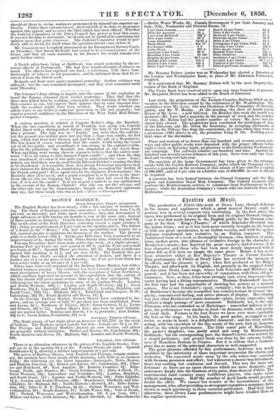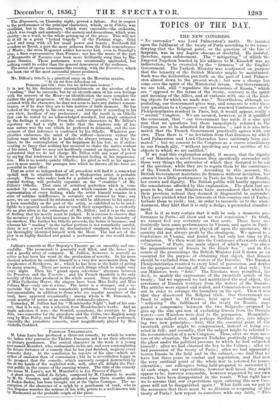litatrts an Nusir.
The production of Fidelio this week at Drury Lane, though deficient in the means and appliances which a great musical theatre ought to possess, was in several respects very interesting. In the first place, the opera was performed in its original form and its original German tongue, —as it was first made known to the English public by the German com-
pany at the then " King's Theatre," of which Schroeder-Devrient was the prima donna ; not as it has been more recently brought on the boards of both our great operahouses, in an Italian version, and with the spoken dialogue transformed into recitative by an Italian composer. This Italianized form of a work so thoroughly German—this dilution of plain,
terse, spoken prose, into phrases of recitative foreign to the character of Beethoven's music—has deprived the great master's chef-d'oeuvre of its true character, and those who had been most deeply impressed with it before felt as if it were no longer the same piece. Hence it has never been attractive either at Her Majesty's Theatre or Covent Garden. This performance of Fide& at Drury Lane has revived the memory of its effects, and the pleasure it gave, when first produced at the King's Theatre, and afterwards (in English, but precisely in the original form) on this same Drury Lane stage, where both Schnieder and Malibran ap- peared; and it has been not unworthy of comparison with those old per- formances. Now, as then, it has been strongly cast, every important cha- racter having had a fitting representative. Madame Rudersdorff has for the first time had the opportunity of showing her powers as a musical actress. She is not Schrcedet's equal, certainly; but in her personation of Beethoven's heroine she resembled her countrywoman in earnest sim- plicity, concentrated feeling, and entire absence of display. Her singing was just what Beethoven's music demands—plain, broad, expressive, and without a single passage of mere ornament. Reichardt, too, is the only Florestan who has reminded us of Haitzinger : somewhat inferior in de- gree, his performance was similar in kind—in dramatic truth, and purity of vocal style. Formes is the best Rocco we have ever seen—probably the best on the stage. In his hands, the good gaoler, so rugged in ex- terior, so warm in heart, is a delightful character; and his truly artistic acting, with his execution of the fine music of the part, had an immense effect on the whole performance. The little comic part of Marcelline, the gaoler's daughter, was nicely acted and sung by Mademoiselle Sedhitzek ; but the corresponding part, the damsel's lover, was marred by a stupid performer ; and greater harm was done by the extreme feeble- ness of Hamilton Braham in Pizarro. But it is seldom that a dramatic piece has so many of the principal characters so well supported. The great pleasure afforded by this performance, however, was much qualified by the inferiority of those important accessories the chores and orchestra. The concerted music sung by the solo voices was executed with German precision and effect; but whenever a chorus was introduced, there was nothing but confusion and discord. This was the more un- fortunate as there are no opera choruses which are more dramatic, and enter more deeply into the business of the piece, than those of Fiddle). The instrumental band contains many indifferent players, who make noise without making music. Half the number of good hands would produce double the effect. We cannot but wonder at the inconsistency of the management,who, afterproviding so strongand expensive a company, have shown so much parsimony in those essential particulars. Had they done otherwise, these Drury Lane performances might have rivalled those of the regular operahouses, The Huguenots, on Thursday night, proved a failure. Not in respect to the performance of the principal characters, which, ra in Fidelio, was excellent, but to the choruses, which were execrable—the orchestra, which was rough and unsteady—the scenery and decorations, which were shabby—in a word, to the whole getting-up of the piece. This will not do at, all in a great "lyrical tragedy " of the Parisian stage. Grisi acted and sang with all her usual power and beauty ; Reichardt did wonders as Raoul, a part the more arduous from the fresh remembrance of Mario ; the stern Huguenot soldier has never had, even in Staudies time a finer representative than Formes ; nor has the music of the part of Marguerite of Navarre ever been more brilliantly sung than by Ma- dame Gassier. These performers were occasionally applauded, but aotbing could be colder than the general demeanour of the audience. The series of operas terminates this evening, with the Trovatore, which has been one of the most successful pieces produced.

































 Previous page
Previous page